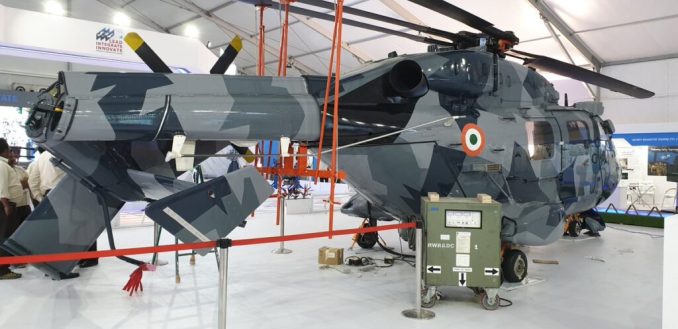
Indian domestic Advanced Light Helicopter (ALH), ‘Dhruv’ offered by Hindustan Aeronautics Limited (HAL) does not meet the qualitative requirements set by Indian Navy for deck operations at sea, reports Economics Times India.
Subsequently, Ministry of Defence (MoD) would not be able to consider ALH for the ongoing Rs 21000 crore procurement process towards induction of 111 numbers of Naval Utility Helicopters (NUH).
This development has put a huge question mark over the capability of HAL to produce modern helicopters.
Search and Rescue (SAR) is one of the basic operations being carried out by Indian Navy at sea, subsequently Indian Navy placed order of 24 Sikorsky MH-60R helicopters.
Limitations Of HAL Druv
Ministry of Defence (MoD) has not come up officially nor communicated on the subject issue to media on ALH. However, it is apparent that there is a problem in accommodating ALH as a contender for the current procurement process. So far, no official communication has come from HAL.
There are a few reasons why the Indian Navy is not enthusiastic about ALH (Dhruv).
The deck operations of aircraft are always under constraints view the availability of limited space onboard ships. When ALH was conceived, it was primarily designed for land-based high-altitude operations. Later they got modified suiting to naval operations. That means HAL has never designed a navy specific helicopter from the drawing board.
The rigid rotors are synonymous for helicopters specific to land-based and high-altitude operations. In the case of sea variants, the rotors heads are to be designed to facilitate ‘automatic rotor blade folding’. Besides, the deck area covered by helicopter after folding the rotor blades should be very minimal. The evolution of blade folding should be less intricate and less time consuming for the operational readiness of aircraft.
The deck space and the hangar space are always at a premium onboard ships. The clearance of space between the folded blades of ALH and the hangar walls on board ship is very less. Ground crews are extremely careful while moving ALH into the hangar to avoid blade tips touching the deck walls of the hangar. Rolling and pitching of ships at sea make the matter more challenging. Though HAL had incorporated the manual blade folding on ALH in 2015, one forward unfoldable blade remains as an impediment for smooth movement of aircraft on decks.
ALH takes more time to get airborne compared to other deck borne helicopters. Turning around a shipborne aircraft in time is very critical for deck operations. SAR missions are to be done with a quick response and a delayed launching of aircraft to the search area can be catastrophic. Automatic blade folding system is one of the Quality Requirement (QR) which was never attempted by HAL view cost overrun.
Ease of servicing is a very critical factor on-deck operations. Many major maintenance evolutions of ALH are very difficult to execute onboard ships.
Besides, the workmanship of ALH needs substantial improvement. The general finish of airframes and associated parts are not at par with their counterparts. Items with the same part number placed on the same variants of aircraft differ in dimensions. Inter cannibalisation of spares across sister aircraft is a nightmare for maintenance crews in an emergent situation.
Height of aircraft/rotor head of ALH is comparatively more than the same class of aircraft. The deck shutter height is very optimal and hence moving ALH inside small deck hangars is a perilous evolution. Folding of the tail rotor shaft is another comfort which HAL could facilitate on ALH for Indian Navy.
All Up Weight (AUW) of ALH is more than 5.5 tons and hence strengthening of under carriage of ALH is one of the key requirements for deck operations. Roll and pitch of ships are beyond the control of naval pilots who come for deck landing onboard ships. ALH needs a stronger undercarriage to overcome eventualities.

Collaborating with leading manufacturers of deck borne helicopters is an alternative available for HAL.
The decision from MoD in the coming days would be very crucial for HAL. The private player from abroad who are in the fray are not happy with the tweaking of existing procurement policy.
© 2020, GDC. © GDC and www.globaldefensecorp.com. Unauthorized use and/or duplication of this material without express and written permission from this site’s author and/or owner is strictly prohibited. Excerpts and links may be used, provided that full and clear credit is given to www.globaldefensecorp.com with appropriate and specific direction to the original content.






Be the first to comment